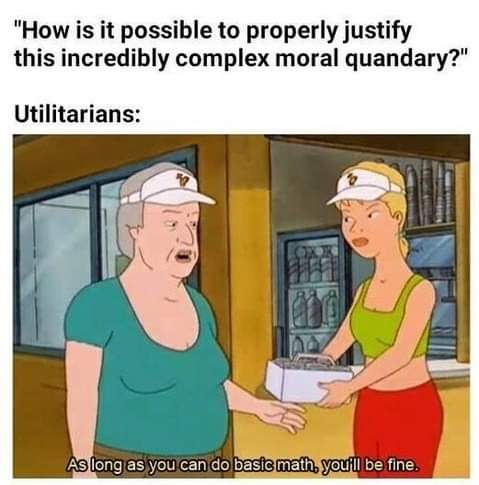this post was submitted on 24 Jun 2023
60 points (95.5% liked)
Memes
4028 readers
2 users here now
Good memes, bad memes, unite towards a united front.
founded 5 years ago
MODERATORS
you are viewing a single comment's thread
view the rest of the comments
view the rest of the comments

The refutation of utilitarianism is that happiness cannot be measured. Neither can the value of a human life.
The entirety of “utilitarianism” as it is currently practiced relies on the idea that you can, and, because of the lack of concrete numbers for these things, you can literally argue for anything you want with it.
For instance, someone could say that working one hour as a landlord is more painful than working for ten hours as a tenant, because the landlord is less used to working, so landlord work hour = -20 happiness units and prole work hour = -3 happiness units, and then go on to conclude that a worker working for 5 hours is justifiable if it prevents a landlord from working for 1 hour. The problem with this is that everything I just said was entirely made up (and the premise is blatantly false), and the units themselves are never defined, not even in actual examples from self-described utilitarians, fundamentally meaning that this nonsense, outright reactionary take I just used as an example of the flaw of mathematical utilitarian thinking, is exactly as valid as every other equation anyone has done to calculate utilitarianism. The entire concept of calculating happiness is vague nonsense and can only make sense in our commodified world where we’ve reduced everything down to a value.
Utilitarianism sort of works as a general principle, but even then, none of this is getting in to the numerous different kinds of utilitarianism that also argue for entirety different actions at different times, and even entirely different premises
Ok so first of all whatever landlords do isn't "work". But apart from that, the distribution of labour in a planned economy is still very much a concrete problem that has to be solved mathematically. In socialism, people will still need to work X hours a year, even if X is now determined by their mental or physical aptitude, the difficulty of the labour performed, the progress of technology, or external conditions; and this X has to be determined in the central planning agency in a calculation that cannot be circumvented by moral philosophy. I'm not saying we can do the same sort of computation for the minimum possible amount of "bad" in the world, morally speaking, but to quantify labour is possible and indeed necessary in order for scientific socialism to be realised.
Nothing you’ve said here is something I was arguing against. There’s a huge difference between mathematically calculating a good labor economy and basing an entire moral system on arbitrary calculations. Labor hours are concrete, “happiness” isn’t.
Also I agree that landlords suck and that was the point of what I was saying with the example. That a statement as nonsensical as “landlords good actually” can be justified with mathematical utilitarianism because of it’s inherently arbitrary nature